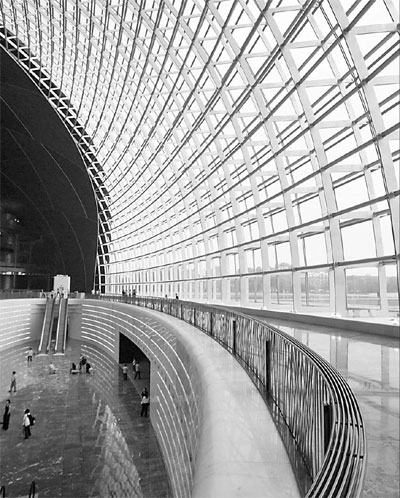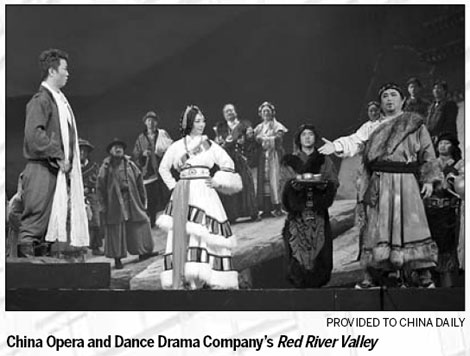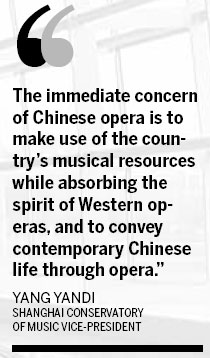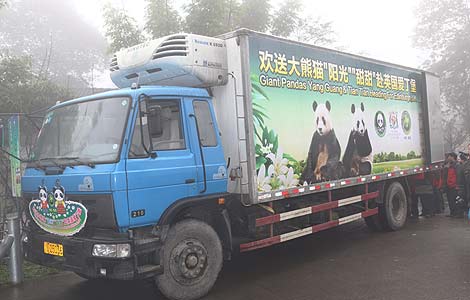The world's a stage
Updated: 2011-12-09 11:11
By Mu Qian (China Daily)
|
|||||||||
 |
|
High-end theaters and opera houses, such as the National Center for the Performing Arts, have spurred the production of original Chinese operas. Provided to China Daily |

China is creating and producing more Western-style operas. Mu Qian reports.
While the term "Chinese opera" typically conjures images of traditional arias shrieked by actors clad in dynastic attire, it is increasingly also associated with Western-style operas.
The first China Opera Festival, which concluded on Oct 30 in Fujian province's capital Fuzhou, presented 14 productions by both official and private domestic companies.
Among them were Western classics like Wagner's Tannhauser and "Chinese national operas" from the 1950s and '60s like Red Guards on Honghu Lake. Most of the shows were originals, such as Tulou, a work devoted to the earthen fortresses of Fujian recognized as a UNESCO world heritage site. All operas were sung in Chinese except Tannhauser,which was performed in German.
"Now is a good time for a national opera festival, as opera is becoming more popular in China," says Tao Cheng, deputy director general of the Ministry of Culture's department of art, which organized the festival.
"More than 20 original operas have premiered in China this year."
As opera companies worldwide are cutting budgets, China is investing more than ever in the performance art, which remains novel to the general public.
 |
Although traditional Chinese operas date to the third century, the first modern Chinese opera was created in 1928, when the "father of Chinese popular music" Li Jinhui (1891-1967) composed Little Painter.
While adopting Western orchestral music, many of the earlier Chinese modern operas borrowed heavily from Chinese folk music and local operas. This can be seen in The White Haired Girl and Red Guards on Honghu Lake, as the productions' most acclaimed arias are based on folk songs.
The development of Chinese operas began to accelerate after reform and opening up in 1978.
In 1992, Savage Land (also known as Wilderness) by Chinese composer Jin Xiang was performed in Chinese by the Washington Opera at the Kennedy Center for the Performing Arts in the United States. That marked the beginning of international recognition of Chinese operas.
China's economic development and consequent proliferation of high-end theaters and opera houses - such as the National Center for the Performing Arts, Shanghai Grand Theater and Guangzhou Opera House - has catalyzed the increase in the number of operas produced in China in recent years.
Last year's Beijing Music Festival debuted three operas in a week. They were Zhou Long's Madame White Snake, Ye Xiaogang's Song of Farewell and a new production of Handel's Semele by avant-garde artist Zhang Huan.
The National Center for the Performing Arts has staged an annual opera festival since 2009. This year's ran from April until July and presented 16 operas and nearly 100 opera-oriented events.
Shanghai Grand Theater launched the Metropolitan Opera's Live in HD series in August, enabling opera enthusiasts to appreciate affordable broadcasts of international opera performances.
National Center for the Performing Arts vice-president Deng Yijiang says his center prioritizes opera. So, 15 of its 19 original productions created since its 2007 opening have been operas.
"Opera is a comprehensive art form, and a country's level of opera creation represents its cultural prowess," Deng says.
The center has compensated for its lack of experience by co-producing with international organizations. These include the US Castleton Festival, the Italian Teatro La Fenice and the Norwegian State Opera.
When the center's production of Rigoletto premiered in 2009, the entire team of performers, including the singers, conductor, orchestra and choir, were from the Teatro Regio di Parma of Italy. The center was only responsible for the stage set and costumes.
When the opera had its second run in 2010, the China National Opera House provided the choir and orchestra. During this year's third run, there were two casts of leading actors - one from Italy and the other from China - and everybody else involved was Chinese.
"We have benefited a lot from working with foreign opera companies, which helps us make our own works," Deng says.
"Our ambition is to produce high-level original operas and promote them internationally."
The center has produced three originals - A Village Teacher, Xi Shi and The Chinese Orphan. Three new ones are in the making.
About half of the works presented at Fuzhou's China Opera Festival were original. These included the China Opera and Dance Drama Company's Red River Valley which tells about Tibetans' fight against British invasion in 1904, and the Sichuan Professional College of Art's Ejiamei, which is based on a folk tale of Sichuan province's ethnic groups.
Shanghai Conservatory of Music vice-president Yang Yandi says most Chinese operas are still not up to international standards. This is because of overly ideological plots and lack of cohesive musicality.
"The immediate concern of Chinese opera is to make use of the country's musical resources while absorbing the spirit of Western operas, and to convey contemporary Chinese life through opera," Yang says.
An even greater obstacle, Yang believes, is small audiences and lack of exposure to new operas.
China National Opera House's former principal conductor Zheng Xiaoying points out that, although operas are regularly staged in Beijing and Shanghai, the art form isn't popular nationwide.
"I enjoyed myself when I was a conductor in Beijing, but when I moved to Xiamen, Fujian province, in 1998, I found there were no opera performances there at all," the 82-year-old says.
"Opera only serves a very small number of people in China."
She founded the Zheng Xiaoying Opera Center at the Xiamen Institute of Technology last year to train opera singers and promote the art form's culture.
At the China Opera Festival, the center presented the Chinese opera Wisteria and Verdi's La Traviata. Both were performed by mostly amateur casts, who have studied at the center.
Compared to the festival's big productions, such as Tulou, which cost more than 10 million yuan ($1.57 million), the Zheng Xiaoying Opera Center's performances used small budgets. But Zheng believes these are better for promoting opera in China.
She also believes more Western operas should be sung in Chinese so they're easier for Chinese audiences to understand.
"I believe opera will flourish in China, because this is a nation that loves music and drama," Zheng says.
"But there must be more missionaries of operas like me."











